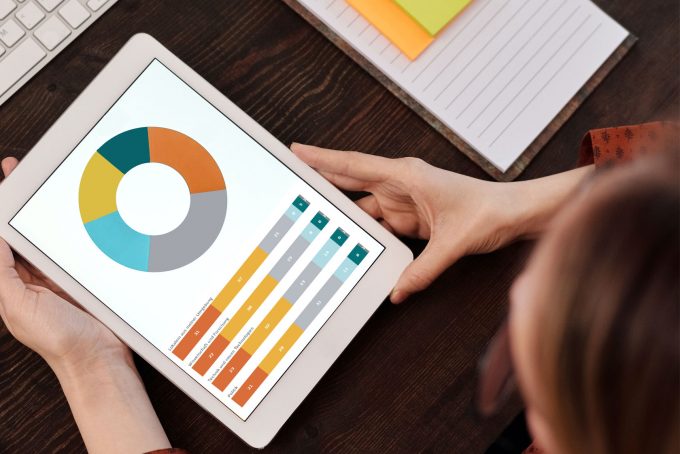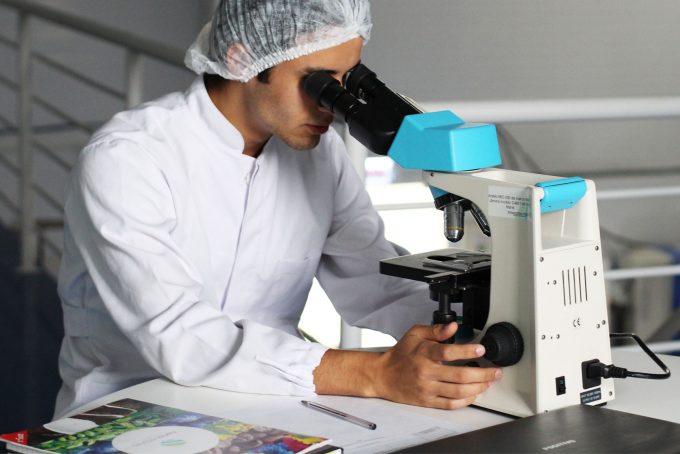
Open Access goes Barcamp, Part 1: A New Networking Opportunity for the Open Access Community
What are the topics that the Open Access community is dealing with at the moment? What are the current developments around the topic of Open Access? Where are the problems – and the challenges? The first Open Access Barcamp from the open-access.network project explored these issues, giving all participants the chance to exchange ideas. We take a look back at the Barcamp in a two-part report. In this first part, the focus is on the topics of the 13 sessions; in the second part we get a behind-the-scenes impression of the organisation of this unconventional format.
by Hannah Schneider (KIM), Maximilian Heber (KIM) and Andreas Kirchner (KIM)
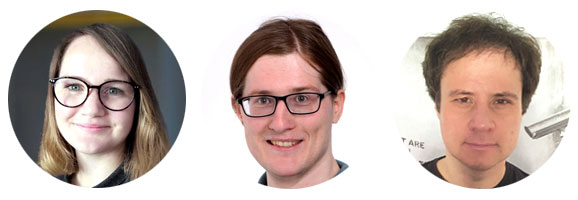
The first Open Access Barcamp took place on 22 and 23 April 2021 – virtually, owing to the pandemic. However, the approximately 80 participants were very enthusiastic about the unusual format. Between 9:00 and 14:30 each day, the participants focussed on a varied programme which they had put together themselves in animated discussions about Open Access topics.
Alongside the annual Open Access Days (German) – a central German-speaking conference on the topic of Open Access – this year’s Open Access Barcamp, which was organised by the Communication, Information, Media Centre (KIM) at the University of Konstanz , also offered the community the chance to exchange ideas, network and learn from each other. The Barcamp format is designed to be more open than a classic conference and deliberately does not use a pre-determined programme. Instead, the participants can suggest topics and hold sessions on issues of their choice. This means that everyone can discuss the topics that they find the most interesting.
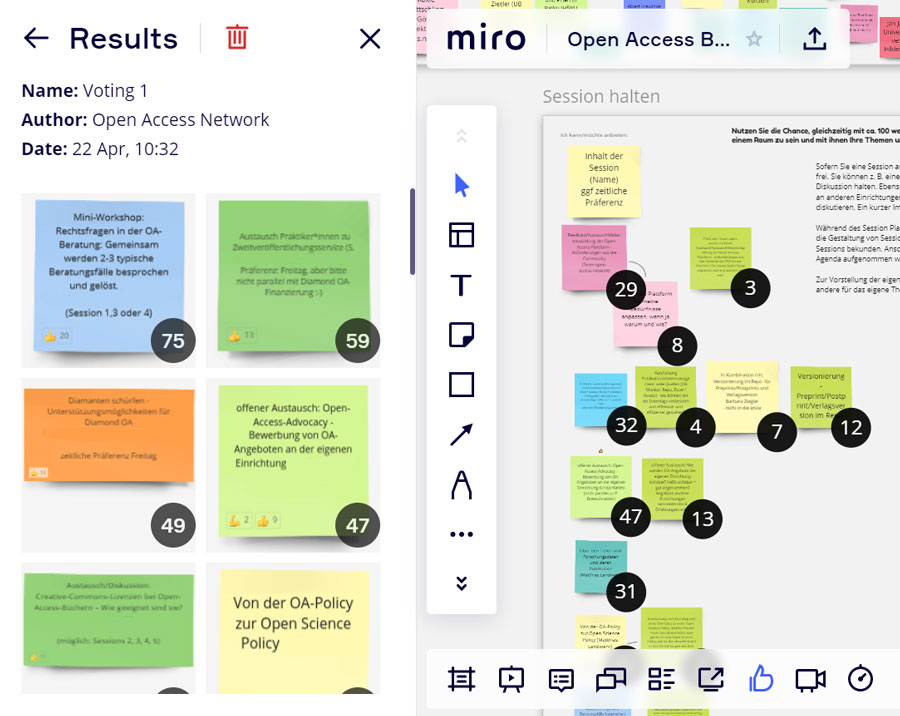
Screenshot #1: Session-Voting (CC BY 4.0)
Great interest in legal topics
During the session planning it became clear that the Open Access community is currently concerned with many diverse topics.
The great majority of participants were interested in legal topics. One of the sessions included a workshop on legal issues in Open Access consulting in which three groups in parallel worked on two typical consulting cases. The first case was the critical evaluation of a publishing house contract. The issue was broached that contracts like these could entail problems such as substantial cost risks or a restrictive transfer of rights. Regarding service offers, participants discussed how to recognise these disruptive elements and the best way of proceeding in a consultative capacity. The second case was a discussion on the topic of image copyright. The topics of who has rights to an image, how the quotation law applies here and how images are regulated in a publishing house contract were discussed.
During one session on Creative Commons licenses, an intensive discussion developed on the extent to which these were suitable for Open Access books. Using the example of the Saint Philip Street Press publishing house, participants critically discussed the aspect of how publishing houses publish again an Open Access book because open licenses allow reuse and editing of the work. Everyone agreed that this problem exists not only for books but also for all works with open licenses. The group came to the conclusion that honesty and transparency are important for Open Access consulting despite this circumstance: “We’re not sales people, we want to help scientists”.
Exchange about the design of secondary publication services
The topic of secondary publication took up a lot of space owing to the considerable interest of the Barcamp participants. Practitioners met for a major discussion session that dealt with the concrete implementation of secondary publication services. In doing so, they not only discussed the services institutions offer for green Open Access but also how these can be implemented at technical, organisational and legal levels. Together, they discussed challenges in the daily dealings with secondary publications such as automatised imports, publishing house requests or legal checks. Google Scholar alerts, data imports from the Web of Science and the integration of Sherpa Romeo into the institutional repository were mentioned as solution approaches. The scope of secondary publication services for scientists in the individual institutions was also discussed. It became clear that the institutions differ very strongly in their activities but also in their capacities.
Publication data management and establishment of a digital focus group
Another topic that was discussed was how the publication data management is implemented in the different institutional repositories. Here the role of the Open Access Monitor (German) of the Forschungszentrum Jülich in measuring the publication occurrence was mentioned, but also the problem that metadata are used very inconsistently and must sometimes also be entered later by hand. The discussion on the topic of secondary publication was continued in depth after the session and ultimately led to the establishment of a new digital focus group.
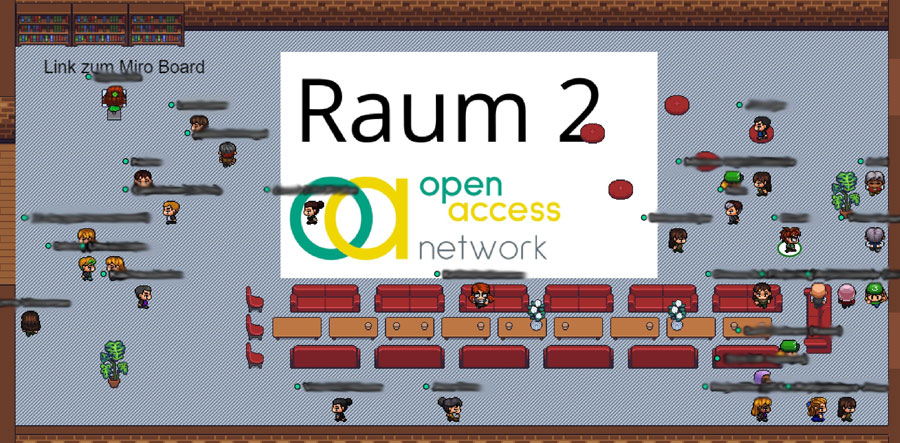
Screenshot #2: Session room in gather.town (CC BY 4.0)
A discussion on the support possibilities of Diamond Open Access and an exchange of ideas about Open Access advocacy as well as promoting Open Access services at one’s own institution also enticed many people to the session rooms. The sessions spanning the publication of research data and the further development of existing Open Access policies as far as suitable Open Science policies all demonstrated that the Open Access community is also interested them. The technical perspectives of publication software were examined as well as the requirements placed on them
Swarm intelligence on the further development of the information platform
The collective know-how of the participants was used to gather recommendations from the community for the further development of the information platform open-access.net into a skills and networking portal. For this purpose, not only was it determined how the current site is used, but also what demands and expectations are placed on a skills and network portal. Among other things, the provision of materials to support Open Access consultation cases and a clearer and more intuitive site structure were mentioned here. These and other ideas will flow into the further development of the website.
Discussion about special publication topics
Concrete publication topics were also discussed: For example, there was a session about the Gender Publication Gap in Open Access. The general issue of the impact of gender in science was taken up and participants discussed whether this effect would be increased or reduced by Open Access. The discussion came to the conclusion that this is a very multi-faceted topic and the data situation is still very thin.
Communication of Open Access transformation
The topic of scholar-led publishing in the field of Open Access books was examined and the project COPIM was presented. Participants also discussed the topic of transformation, including the aspect of how the project DEAL and the Open Access transformation could be communicated at one’s own institution. Challenges mentioned here included the reallocation of budgets as well as the difficulty of convincing authors to choose always the Open Access option for DEAL publications. The group agreed that active communication within subject departments and committees as well as information material on the website are currently the most promising methods.
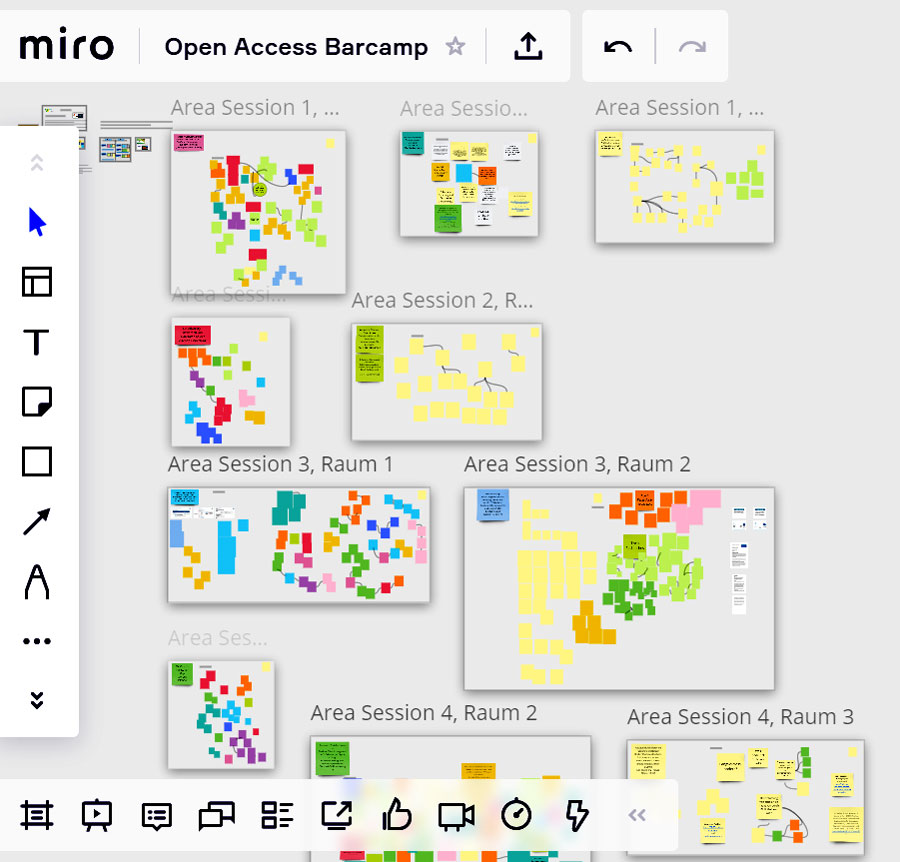
Screenshot #3: Collaboration and transcripts of the sessions on MIRO (CC BY 4.0)
Diverse opportunities to chat about the everyday challenges of Open Access
The programme’s flexible design offered the participants in the Open Access Barcamp a variety of possibilities to chat about current and everyday Open Access topics. Everyday challenges and issues were discussed in direct dialogue with other practitioners, both in the big sessions and in smaller groups.
Even though, as mentioned at the beginning, the Open Access Barcamp took place in a virtual setting, the readiness of the participants to get actively involved and help shape the event was considerable. Our organisational team found that it was important to create an appealing virtual environment to enable an exchange of ideas and networking to take place online too. In the next blog post we describe the chances and challenges that planning such a dynamic event as an online format brings with it. Stay tuned!
More blog posts about the Open Access Barcamp
- Open Access goes Barcamp, Part 2: How to Organise Networking Online
- Open-Access-Barcamp 2021 (German)
- Tub.torials: Open Access Barcamp, 22.04. / 23.04.2021 (German)
You may also find this interesting
- Third-party material in Open Access monographs: How far-reaching is the Creative Commons licence really?
- Barcamp Open Science 2021: opening up new perspectives
- Open Access Days 2020: Highlights & Tips
This text has been translated from German.
Hannah Schneider is a member of the the Team Open Science at the Communication, Information and Media Centre (KIM) at the University of Konstanz and is involved in the BMBF-funded open-access.network project. Her tasks include organising events and editing the Website open-access.net website.
Portrait: Hannah Schneider©
Andreas Kirchner is a member of the Team Open Science at the Communication, Information and Media Centre (KIM) at the University of Konstanz and coordinates the BMBF-funded project open-access.network together with Dr Anja Oberländer. He is also a board member of the Open Access publisher meson press (Lüneburg) and the non-profit foundation ScholarLed (The Hague).
Portrait: Andreas Kirchner©
Maximilian Heber is a member of the Team Open Science at the Communication, Information and Media Centre (KIM) at the University of Konstanz. He is involved in the “open-access.network” project.
Portrait: Maximilian Heber©
View Comments

Digitalisation in Libraries: 5 Lessons from the Corona Crisis for the New Normal
Through COVID-19, the world suddenly became one huge shared experimental space. Even...

